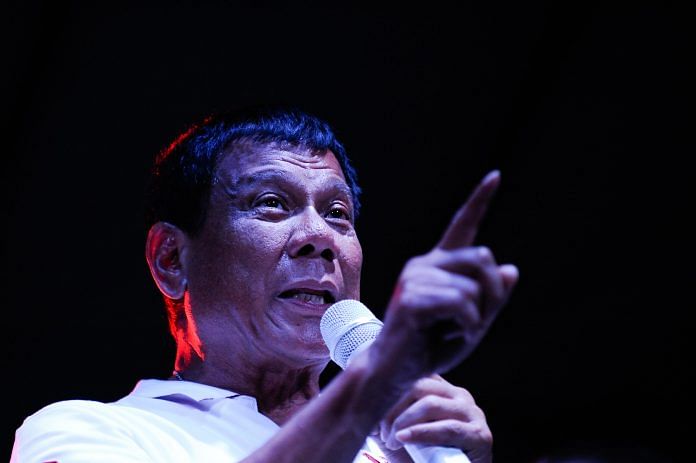A preliminary probe into the extrajudicial killings in Philippines has begun, with President Rodrigo Duterte as the prime focus. The United States finds itself in an important bargaining role with the Saudi Arabian Crown Prince visiting the country for two weeks. Meanwhile in the Caribbean, Antigua and Barbuda are about to have an extremely odd election.
The trial of the century
“Almost overnight, the Southeast Asian country transformed from a “bastion of human rights and democracy” into potentially the latest member of an exclusive club of nations that have seen their leaders prosecuted for crimes against humanity,” writes Richard Javad Heydarian in the Washington Post. In response, Duterte has declared that his country will withdraw from the International Criminal Court.
Heydarian tries to analyse Duterte’s “mind-boggling” popularity and rise to power, which he situations within the context of Duterte and his populism. Duterte oversaw a bloody campaign against drug dealers since his ascent to power in 2016, and has allegedly had thousands killed since 1988. “Stylistically, as a president, and substantively, as the former mayor of Davao, Duterte is a hands-on, macho leader who has little appreciation for institutional checks and balances.”
“His signature “war on drugs” campaign has — even by his own admission — fallen short of its objectives, while triggering domestic and international backlash,” writes Heydarian.
“The Southeast Asian country, like Gramsci’s Italy, is caught in an interregnum, struggling to anchor itself somewhere between strong-man populism, autocratic nostalgia and democratic resistance — with no clear resolution on the horizon. The Philippines has entered a twilight zone.”
An odd election
“Last month Antigua and Barbuda’s prime minister, Gaston Browne, set March 21st as the date for a snap parliamentary election. That is 18 months earlier than it needs to be, and barely six months after Hurricane Irma blasted Barbuda, the smaller of the Caribbean state’s two islands,” writes The Economist.
It gets odder, they write. Barbuda’s 1,600 inhabitants were evacuated to Antigua, from where they haven’t returned. “All the voting for the 17-seat parliament will take place on Antigua. This means that those Barbudans who returned to the island after the hurricane forced all inhabitants to leave will have to take a 40km (25-mile) ferry ride in order to have a voice in choosing Barbuda’s single MP. Mr Browne says the decision is out of his hands. By law, each constituency must have just one presiding officer to monitor the vote. The electoral commission has stationed that person in Antigua, to which most Barbudans have been displaced.”
“Mr Browne could have tried to change the law and did not. This has sharpened the resentment of some Barbudans towards the inhabitants of the country’s richer, bigger island. The electoral commission will lay on a ferry service to bring voters from Barbuda to the polls, but that does not satisfy some islanders.”
What this means is that Barbuda’s one seat could determine whether Brown stays in office. The island has been split between his Labour Party and the Opposition, consisting of the Barbuda People’s Movement and its ally, the United Progressive Party.
“For Barbudans the stakes are also high. In February the government ended a system that had prevailed on the island since soon after the end of slavery in 1834, under which land formally belonged to the government, but was held in trust for the community and therefore was effectively communal land. Barbudans were able to lease houses on tiny plots of land. Most of the island’s territory was shared woodland or pasture for livestock.”
“The election offers a quicker route to blocking the resort in its current form and restoring communal ownership. The BPM and its opposition ally say they will do both if they win. They claim that the odds of that happening would be better if Barbudans who stayed on the island could vote at home. Perhaps that is why Mr Browne likes the idea of putting deep blue sea between voters and the polling station.”
Deciding Yemen’s future
Mohammed bin Salman is currently in the United States to promote his image as a reformer who is trying to modernize Saudi Arabia, writes the New York Times in an editorial. But that image is “stained by his chief foreign policy initiative, the humanitarian catastrophe that is the war in Yemen, in which at least 10,000 civilians have been killed.”
The United States has been Saudi Arabia’s main supplier of weapons and military aid. “There was no immediate sign that President Trump used his meeting with the crown prince at the White House on Tuesday to try to persuade him to halt the war.”
“These are sensible ways to help end the attacks, as the need for a political solution in Yemen, one of the poorest countries in the Arab world, grows more urgent by the day.”
Some members of Congress proposed a bipartisan resolution to end American involvement within a month unless it is authorised by legislation. But part from Yemen being a humanitarian disaster, “members of Congress who have supported the resolution are concerned about the legal basis for American involvement.”
“For too long, Congress has abdicated its role as America prolonged its stay in some wars and expanded into others, like Yemen. And presidents have been too reluctant to share these crucial decisions with lawmakers.”
“Resolutions like this can and must still be pursued to force serious debate and accountability.”



